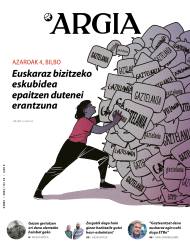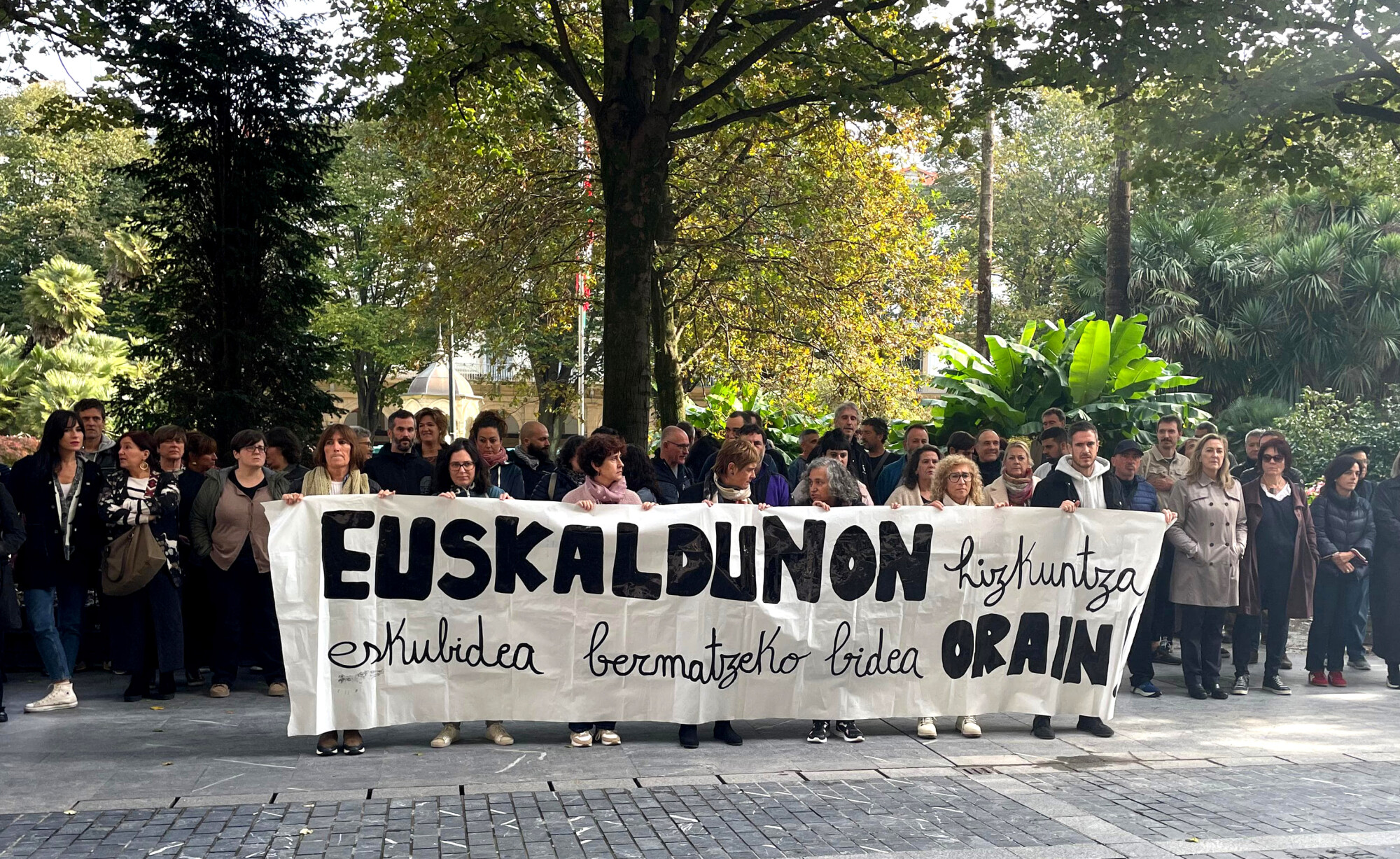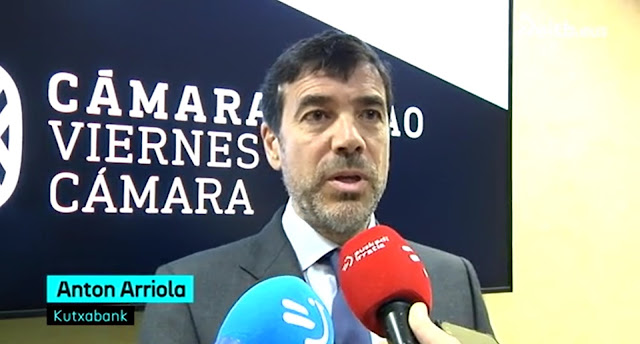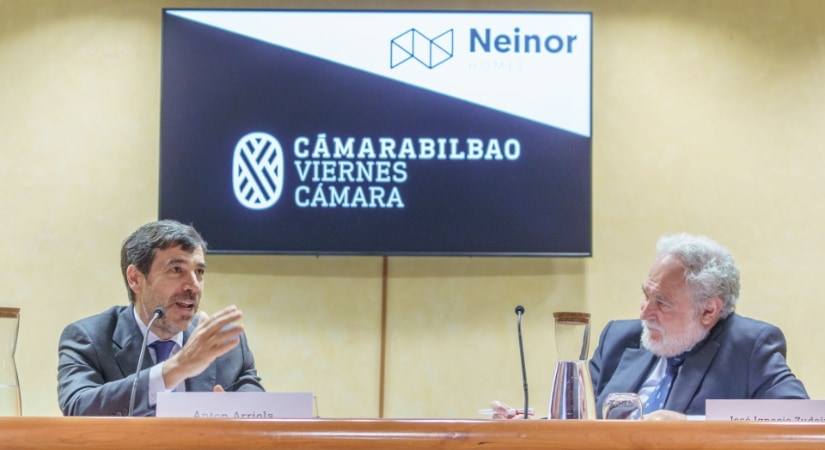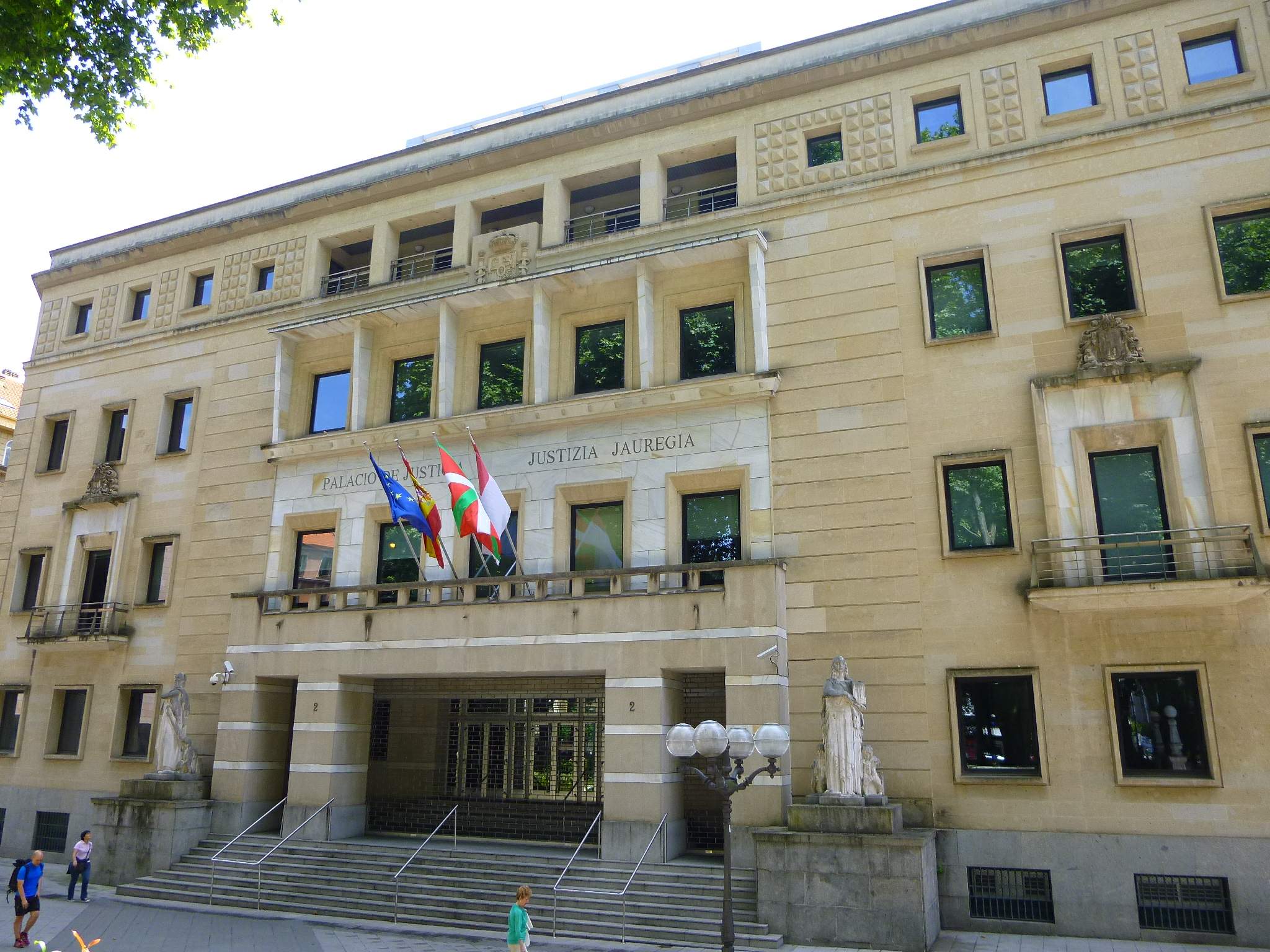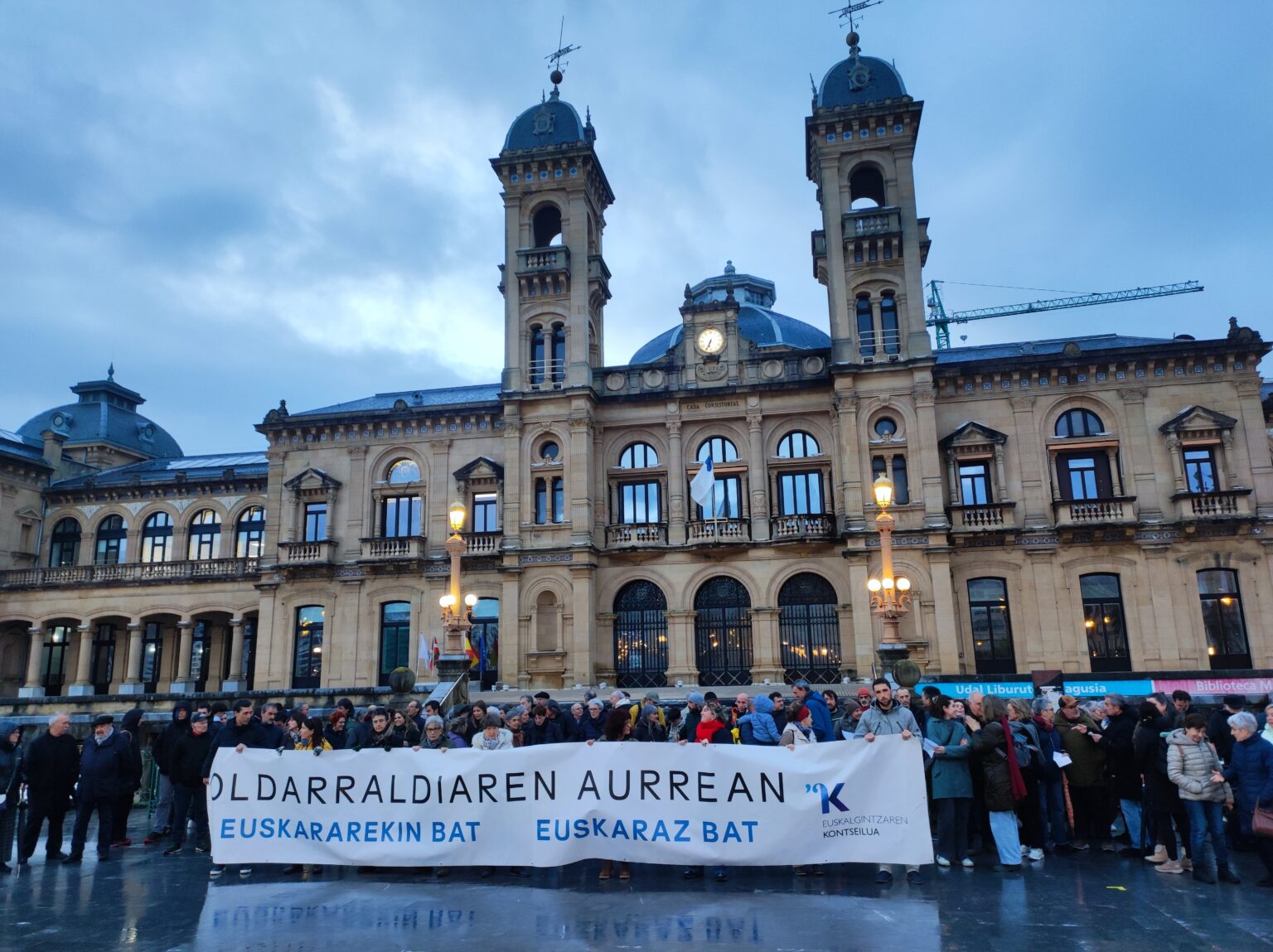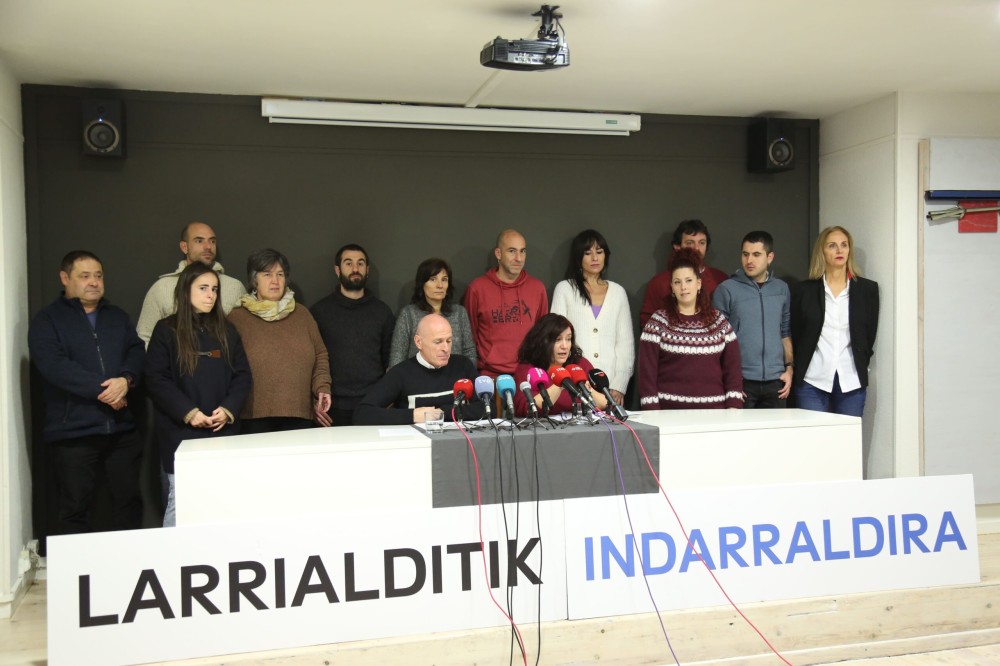Another aspect to guarantee the predominance of Spanish
- Fundación Uliazpi, Llodio, Barakaldo, Irún, Erandio... Or in other words: linguistic profiles, article 6.2 of the Municipal Law, clauses in hiring... They are telling us that the Euskaldunisation of the public sector has gone too far. That is what judicial aggression comes to. As a consequence of the limitation of linguistic policies, there will be fewer municipal agents, Ertzainas, nurses, Basque administrative staff. The Council of Euskalgintza has called for a demonstration to assert the language rights they want to crush by judgment on 4 November.

Euskalgintzaren Kontseiluak azaroaren 4ko manifestaziora deitu ditu herritarrak Oldarraldiaren aurrean: euskararekin bat, euskarak bat lelopean. 17:00etan abiatuko da Euskaldunatik (Bilbo). Kontseiluak oldarralditzat jo du azkenaldian auzitegietatik heldu den euskararen aurkako sententzia andana. Ez ditu sententzia isolatutzat, eta botere judizialetik hizkuntza politika aurrerakoiak mugatzeko eta herritarren hizkuntza eskubideak murrizteko joera gorakorra salatu du.
Judicial and political aggression, among others, has deleted Section 6.2 of the Municipal Law. This ruling affects the municipalities of the Commonwealth of Basque Municipalities UEMA that work exclusively in Euskera. We talked to the mayors of Mutriku, Getaria and Aulesti. We have seen them reassured, with no intention of going back.
[When making this report we did not know the last sentence. The High Court of Justice of the Basque Country suspends certain articles of the Development Decree of the Municipal Law on the Basque Country. More information on this link].
Aulesti is located in the Basque region of Lea Artibai. It's about 650 people. Irati Urberuaga is Mayor of the same (EH Bildu) and a member of UEMA’s management. He comments with satisfaction on the citizen concentration in the September festivities. He tells us that he will send us the photos and tells us the motto with which the demonstration of November 4 has been called: The hardest answer is in Basque. In 1989, a municipal ordinance was approved for the exclusive use of the Basque Country, prior to the creation of the UEMA. In previous years the secretary also recorded the records in Basque. That is, it is natural for them to speak more in Basque. Elected municipal officials have always been Euskaldunes and workers. Once, a citizen asks to be given a paper in Spanish because he does not know Basque or is not literate in Basque. It is delivered in Spanish to the applicant. More work with public institutions: "In the past, from the Basque Government, we collected the letters in Spanish and in Basque saying that we sent them. Today we receive them in both languages." They also had to do with the Prosecutor's Office. The City Council responded that it wanted to send it in Spanish and receive it in Basque: "We were told that, as we had the right to work in Basque, they had the right to work in Spanish. Somehow, we were accepted our right."
It acknowledges that they were concerned about the annulment of article 6.2 of the Municipal Law: "At the City Hall we hear the following question: 'What should we start working now in Basque and Spanish in a Basque people? '". No, they have decided to continue as before, only in Basque, always offering those who request it in Spanish.
.jpg)
Haritz Alberdi is Mayor of Getaria (Gipuzkoa) of EH Bildu. Its population is around 2,800. Big on the Aulesti side. However, municipal elected officials and workers are also Euskaldunes there and are dedicated exclusively to Basque. The Mayor does not know what adjectives to use to define his performance: "I don't know how to say, that speaking in Basque is normal, normalized activity, that we work naturally... We've been like this for years." Alberdi considers interesting microclimates to the Basque municipalities. They are municipalities in which the rights of all people are respected, which have the capacity to communicate in both languages, and are able to respond to the linguistic demands of any citizen: "Other institutions cannot. We respect citizens' rights at all times." We ask him if they are concerned about aggression. The situation gives him more sadness than discomfort. Where there was broad consensus, the judge says they are influencing political decisions. Despite the obstacles, it believes that the Basque municipalities will move forward. At Getaria, at least, they intend to continue as before: "We think what we do is normal! All this would be totally unusual to start changing."In Mutriku, after the 2012 coup, they remain the same in
Mutriku (Gipuzkoa, with 5,300 inhabitants), in
2012 the Madrid government opened two fronts for linguistic and band reasons to the City Hall. The municipal records were sent only in Basque to the Government Delegation. They received the complaint and were asked to send it in Spanish as well. Following the 1982 law, they set out their arguments and made the judgment favourable. Joseba Palenzuela is the current mayor of Mutriku and already was. Remember how they felt: "We felt attacked, we had to defend ourselves without mistake, we had to use economic and human resources." However, this fact of 2012 has had a positive effect in the municipality. The citizens understood that the attack on the city hall was also against the local community. According to Palenzuela, on that occasion they received broad support from the citizens and today the mayor perceives the same environment. This sentiment seems logical to Palenzuela because Mutriku is a Basque people. He hopes to continue working as before, "because the Basque is ours and it is up to us to keep all the effort that has been made in the city hall for decades."
Linguistic profiles are calling
for cuts in language profiles in this offensive against the Basque Country and are using workers’ rights word by word. We have been with Pello Igeregi, head of Euskera of ELA, and with Urko Aierbe, secretary of Euskera of LAB. Both of them are clear that this wave of sentences has violated the linguistic rights of the Basques.
Pello Igeregi wants to talk first of all about the starting point. Today, in the administration, the linguistic rights of the Basques are those that are not guaranteed, neither of the citizens, nor of the staff of the public services. To work in the public sector we must know Spanish, "this imposition is considered natural, but they have as imposition any measure in favor of the Basque Country. Spain clearly wants to impose Spanish. That is why we are suffering from measures and rulings to stop any normalisation step". Igeregi considers that political and judicial aggression is organized. In the opinion of Urko Aierbe, the courts are provoking an involution in linguistic policies through the judicial apparatus, they are placing limits on the measures in favor of the Basque Country beyond the competences corresponding to them. Some trade unions, individuals and some political parties are fuelling aggression. A framework for aggression is being offered. Aierbe cares about the facts: "This is not a short-term issue or a call for employment, a language policy is being consolidated for the coming long years. Euskaldunization is at a critical moment and the response of the Euskaltzales is fundamental to face it".
Two trade unions, CCOO and UGT, say that workers’ rights are violated through linguistic profiles. Aierbe believes that they have revolutionized the rights discourse: "The supposed rights of certain workers are being imposed above the linguistic rights of their colleagues, as well as above the right of any citizen who has the right to be treated in Basque". In other words, the courts are recognising that workers who do not want to know Basque have more rights. Igeregi adds that there is no universal right to work in the administration.
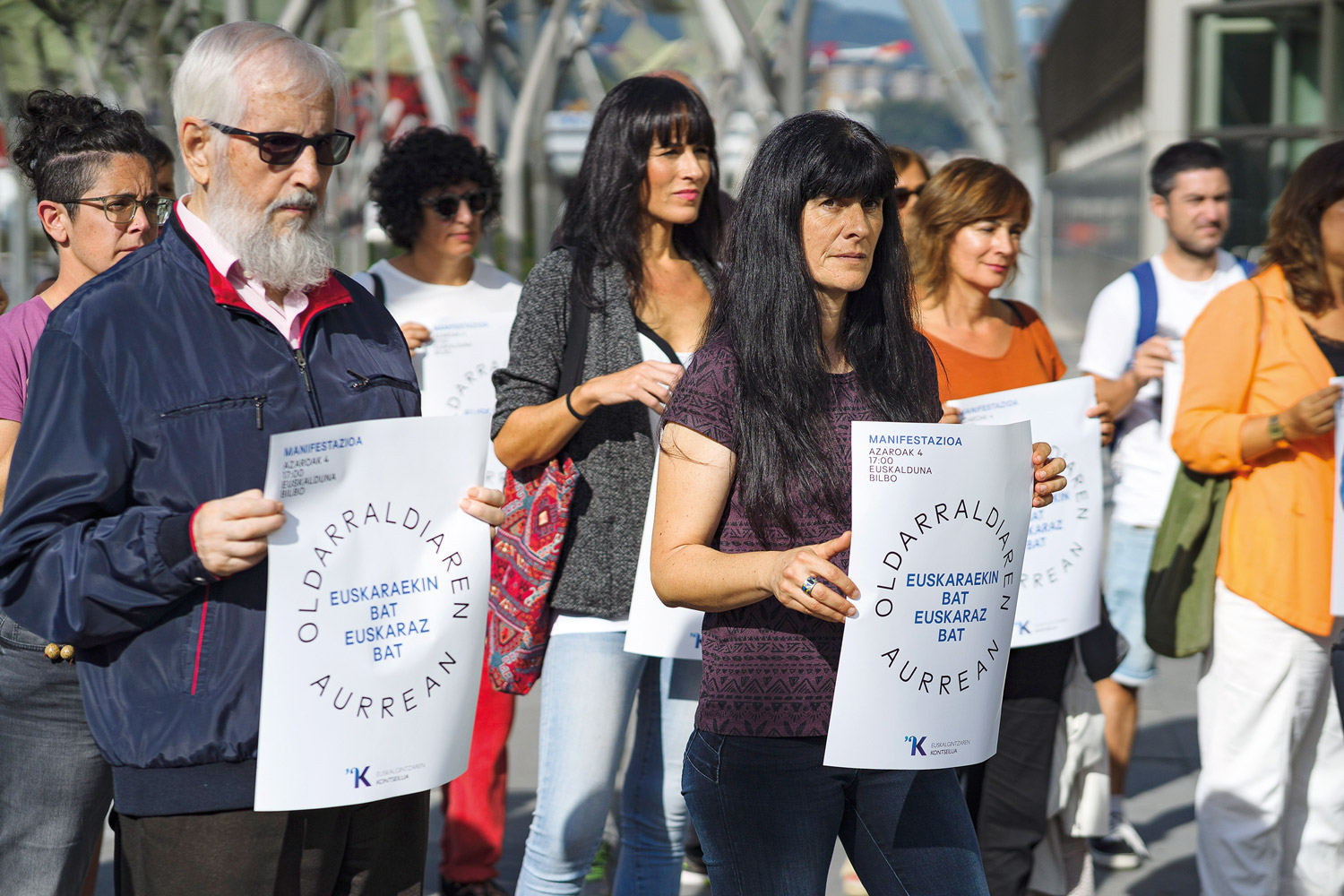
For those who believe that the Euskaldunisation of the
administration has gone too far, linguistic profiles should be limited, rather than now. They talk about discrimination to disguise attacks on the Basque people. There is talk of the main workers, temporary longterm workers who now have the possibility of stabilizing the situation, immigrants and precarious sectors. Anti-Basque agents believe that many citizens cannot work in the public sector because they do not know Basque, discriminated against. Aierbe has called this a malicious speech: "They want to use the most vulnerable social sectors to fight Euskera, as if they were themselves against Euskera! Workers in these vulnerable sectors also have the right to know and use Euskera." To dismantle the discourse of discrimination, Igeregi has set the example of university studies, that is, the doctor must have medical studies and the citizen who does not have them is not considered discriminated against to work in the public sector. And so Igeregi continued: "The knowledge of the Basque Country is a discrimination against other knowledge. It surprises the amount of knowledge to ensure to work in management. The oppositions must answer questions about the Spanish constitution and the state. Imposing Spanish nationality is natural, asking for Basque is not natural". According to Igeregi, many of those who have difficulty working in the administration are low-income citizens and do not stay out of the public services by the Basque Country, especially because they do not have higher education.
According to
Aierbe and Igeregi, for many citizens learning Basque is a road full of obstacles. They consider that both employees who work in the public sector and future workers who will do so must be guaranteed the possibility of learning Basque, adapting the conditions and making the resources available. In this sense, Aierbe has claimed that it is free to learn Basque.
What do you do not take steps back?
What are the next steps? How can we cope with political and judicial aggression? Aierbe and Igeregi remind us that the Council, LAB and ELA agreed and presented in September 2022 the proposal for an Euskaldunization of the Basque public sector. The three agents approved the proposal in a climate of debate on the decree that will regulate the Basque public administration. For the three players, this basic proposal sets out the bases and measures for the Euskaldunisation of the public sector. The proposal lays down a specific time-limit for the administration, that is, 15 years. They have taken account of the fact that in the coming years half of the public sector workers will retire and have seen it as a suitable generational change for the transition process. Within 15 years, all staff must ensure minimum Basque knowledge. In this way, Euskaldunes would be guaranteed the right to receive services in Euskera, and in turn, workers could work in Euskera. The document agreed between the three agents says that it is not a proposal built against anyone, that is, no one who is already working in the administration will be excluded. The resources and conditions for learning the language would be made available to staff who do not know the Basque language. There would even be exceptions for those who for age or other reasons cannot
estudiar.La proposed was incorporated as a contribution to the process opened by the Basque Government and also referred to political parties.
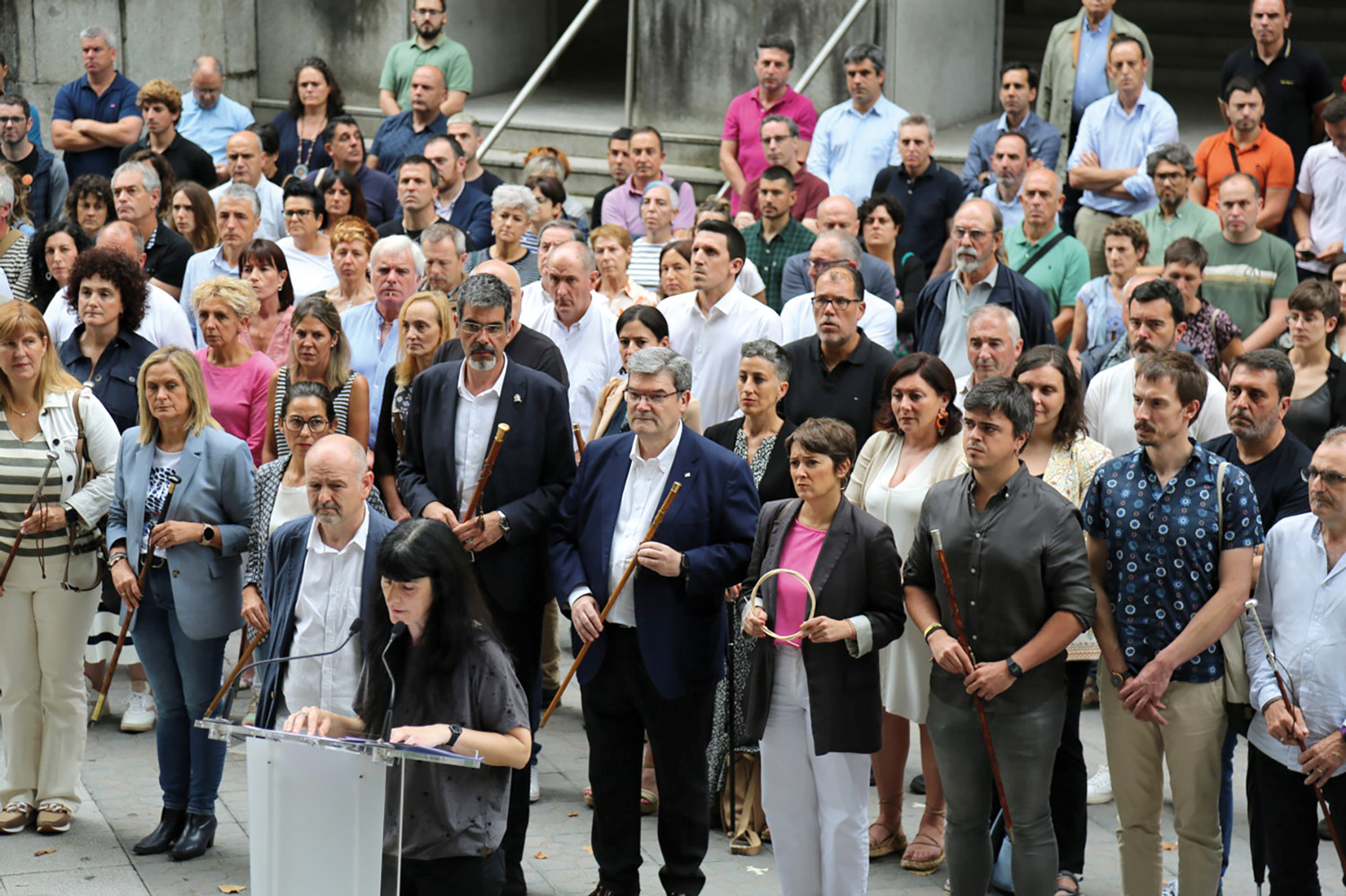
What
they
expect from the decree They are not very optimistic about the decree prepared by the Basque Government. For Aierbe it’s time to play and jump, but: "I do not know if you are not preparing the decree that the courts would approve for the administration to be Euskaldun and for the citizens to be cared for in Euskera." That is, if they are not working out of fear of what the courts are going to say. Among the new measures, asymmetry is one of the issues that has sparked great debate. According to this measure, two requirements will be set for each job, one written and the other oral. Unlike what is happening now, a different level may be required in both. For example, B2 may be requested in writing and C1 in an office. Aierbe suspected of risk in this form of assessment: "Asymmetry can sometimes be justified, but it should be exceptional. Our concern is whether there is no room for a general reduction in language profiles. Instead of taking further steps, you can open the door to a retreat. When flexibility is offered in Euskaldunization, unfortunately, it is for sale".The risk increases with the relaxation observed in the administration: "Trade union representatives tell us that there is a relaxation in language profiles and, at the moment, asymmetrical loopholes or the possibility of extending deadlines are likely to increase".
Igeregi does not expect major advances in the decree, expects a decree that renounces bilingualism: "The government is full of complexes, due to pressure from the Basque sectors. Behind it is a political decision: Most of the parties in Hego Euskal Herria do not want the Basque Country to be the subject of debate, because they consider that they are better placed to face the elections if it is not any issue related to Euskera and identity". Igeregi has claimed that on 4 November we must take advantage of it so that the Basque people show that it is high time we did not have to insist on the Basque administration: "We Basques have to ask for our linguistic rights in very vulnerable situations: when we go to the emergency room, when the police have to fine us, when we go to court, when we do not want to create conflicts with public employees."
Watch Segurola, UEMA Coordinator
"They fear how far we're going to go."
What is your assessment of the sentential chain?You try to make language
policy from the courts and in a country like ours, it causes a lot of linguistic normalization. Judgments happen, not by chance. The Spanish parties are seeing that we are making progress on language profiles, on recruitment clauses... and are taking measures against. They fear how far we go llegar.El Article 6.2
of the Municipal Law has been repealed by the Spanish Constitutional Court. How will it affect the municipalities of UEMA?
UEMA, since its founding, has made it clear that it will work in Basque in our municipalities. We have worked in Basque before the Municipal Law and we intend to continue doing so. We have always had a sword for working in Basque, and now that sword is a little closer. In the event that any citizen or councillor makes any claim, we shall return to court and we shall have to wait for him to speak against.
What are they going to do on a daily basis in city halls?
Our intention is to continue as it has been, but it is true that it influences reality. In the City Hall, who judges criteria on a daily basis is the municipal secretary. For the secretary, it is not the same to have legal protection as to have another law that allows interpretation. The opinion of the secretary is very important in the decision of any mayor or councilor. We have been called by quite a few secretaries asking, "What will happen now? ". We went to the municipalities to reach agreement on the criteria that should be approved. For us the path is much easier if the secretary sees it clear that legally it is possible to move forward. If Article 6.2 of the Municipal Law tells you that the City Hall can do it only in Basque, the Secretary will be able to move forward, but if the law does not say so, and in the spiral, if they say it is illegal, the Secretary’s interpretation is very important when deciding how to operate in the City Hall.
“We have always had a sword on top and
now that sword is a little closer”
So, interpreting the laws.
They rise in town halls. It's a circus. If before it is difficult to carry out a standardization process in two hegemonic languages, it is a circus to have to walk full of swords and fear at all times what judges will say.
Can further claims be expected for the environment?
No doubt. From small towns we receive individual complaints. The fact is that many do not go to court. However, if the socialist councillor wants to get into the Basque country, he will begin to ask that this be brought in Spanish, also in Spanish, and our small municipalities have no resources to translate, to make the full functioning of the city council in bilingual. If they do so, we have to do so, and if we do not do so they go to court. We are now more vulnerable to such situations.
What do municipalities need to act with guarantees only in Basque?
At the time, the Municipal Law was reached with great political consensus. A new attempt will have to be made and negotiated. Because it is true that, although it always depends on Spain, there are possibilities here to articulate protection further through advances. For example, with some amendments to the Basque Civil Service Act, some problems with language profiling could be resolved.
From linguistics or glotophobia and, of course, hatred against Basque, we have often seen our Basque become the dandruff of all sticks. Last of all, the president of Kutxabank, Anton Arriola, has been shaking our language and giving us galantas.The President of Kutxabank,
... [+]
Euskal Herrian Euskarazek manifestazioa deitu du apirilaren 6rako, 11n EHEko bi kide epaituko dituztelako. Hiriburuetatik autobusak antolatzen ari dira. Bi helburu bete nahi dituzte, batetik, epaituak izango diren bi kideei babesa erakustea, eta bestetik, euskararentzat justizia... [+]
"Poloniar bat etortzen bada eta bost urte pasako baditu proiektu batean, joder agian ez zaio egoki irudituko seme-alabek euskaraz ikastea, ezta?", bankuko lehendakari Anton Arriolak adierazi duenez. Euskalgintzako eragileek gogor kritikatu dute eta esandakoa... [+]
Ba al dakizue frantses batzuk harritu egiten direla mugaren alde honetan ere euskaldunak bagaudela jakitean? Ba bai, harrigarria bada ere, behin, Donostian, frantses batzuei entzun nien sinetsi ezinik beren buruari galdetzen: “Saint-Sébastien est au Pays... [+]
Gasteizko 1 zenbakiko Auzitegi Kontentzioso-Administratiboak emandako epaia berretsi du EAEko Justizia Auzitegi Nagusiak. Lan poltsan parte hartzeko euskara maila altuenaren baliokide diren 3. eta 4. eskakizunak indargabetu zituen Gasteizko Auzitegiak.
Euskal Herrian Euskarazen arabera, Tolosako tren geltokiko segurtasun agente batek eraso egin zion militante bati, agenteari euskaraz hitz egiteko eskatu ziolako. Tolosako alkateak "kezka" adierazi du eta azalpenak eskatuko dituela jakinarazi.









